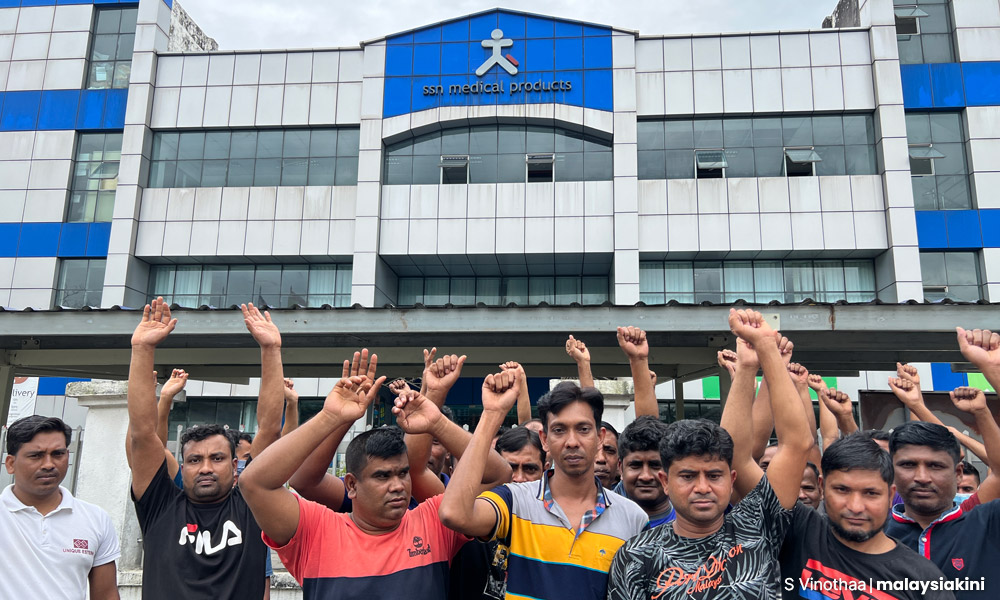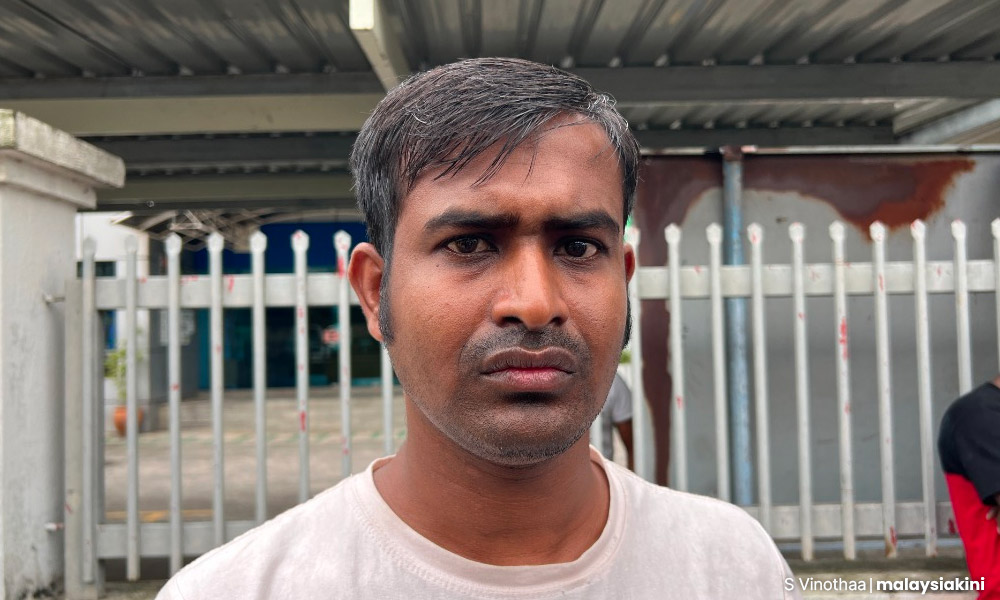More than 80 migrant workers at SSN Medical Products Sdn Bhd entered Day Three of their strike today in a last-ditch effort to recover their unpaid wages and overtime exceeding RM400,000.
The management of the latex glove factory located in Balakong entered into an agreement with the workers yesterday to settle their basic salary for the month of November before Dec 30, until which work will not resume.
The factory, which employs 100 workers, also agreed to pay the overtime owed to workers for the month of November before Jan 6 next year.
The agreement addressed to “foreign worker operators” and signed by the company’s head of operations, Fatim Hanimah Abd Karim, also promises to chart out a payment plan for five months of unpaid overtime and unpaid wages that was not specified in the agreement.
With no trade union representation, the workers were assisted by Parti Sosialis Malaysia (PSM) Kajang Branch in the negotiations, and branch chairperson S Koyilvani said they will proceed with the next cause of action if the employers failed to honour the agreement.
The December salaries and overtime were not discussed.
‘Troublemakers’
SSN Medical Products director and majority shareholder Clinton Ang said December salaries will be paid on time and refuted that pay was frequently delayed.
Admitting that the company had fallen in arrears in salary payments this month, Ang attributed this to the global latex glove industry experiencing “precarious and tough times”.
Ang estimates a loss of up to RM500,000 during this five-day stop-work period.

He accused a select few Bangladeshi migrant workers with disciplinary issues of instigating the strike, adding that workers had “enjoyed everything over the last two years”.
“This is not the first time they have stopped work and the troublemakers don’t allow the others to work.
“They even stopped my friend’s contract workers from going inside my factory.
“They purposely chose a public holiday to do it,” he complained.
However, according to data analytics provider, emis.com, SSN Medical Products reported a net sales revenue increase of 116.11 percent in 2021 with a total growth of 57.12 percent.
After the negotiations, the atmosphere at the worksite was quiet, with the majority of the workers returning to their lodgings within the factory confines, too afraid to leave the premises without their passports.
Workers told Malaysiakini that they have not been in possession of their passports over the past four years of their employment with SSN Medical Products.
Expired work permits, unkept promise
According to the workers, migrants made up the majority of the workforce with 70 Bangladeshis, eight Nepalis, three Indonesians, and three Myanmar, who worked two shifts in the production, packing, and warehouse sections of the factory.
The Bangladeshi workers are claiming unpaid overtime from June to October this year and varying amounts of unpaid wages dating back to February 2020.
PSM records show that the Bangladeshi group who came forward with their claims were owed between RM4,000 and RM9,000 each in unpaid wages and overtime.
The leader of the Bangladeshi group, Khan Sagor, 34, told Malaysiakini that the workers were in a very vulnerable situation because they didn’t have their passports with them and were afraid of being sent back home without the wages owed to them.
Khan, who claims to have paid RM18,000 to his agent in Bangladesh to come to Malaysia, said he has repaid the bank loan but owed friends back home who helped his family whenever his salary was not paid.

Workers were also afraid of being hauled up by the Immigration Department as they were unsure if SSN Medical Products had completed their work permit renewals.
PSM caseworker D Letchimi Devi said all the Bangladeshi workers’ passports were valid but only 16 workers had valid work permits.
All other workers’ biometric thumbprints would expire at the end of this month.
“The employer is supposed to complete the permit application before the biometric thumbprint expires but there has been no indication of this.
“The employer faces huge fines of up to RM10,000 per worker for failing to employ a documented migrant worker and this will have a compounding effect on the situation,” she said.
Letchimi said, meanwhile, workers had also been subject to threats from law enforcement because of their precarious immigration status through no fault of theirs.
Letchimi explained that the Bangladeshi workers were part of a group of 130 workers employed by SSN Medical Products through a government-to-government agreement.
The workers came in five batches and started arriving in 2018 on a three-year contract with the company.
Meanwhile, according to the Employment Act 1955/22, salaries have to be paid within seven days after the last day of a salary payment period, which workers allege was frequently flouted.
Citing case number KBR1104/374/2020, Letchimi said the workers had filed a complaint with the Labour Department in 2020 but no action was taken.
“We have also reached out to the Bangladeshi Embassy but they didn’t provide any assistance to resolve this matter,” she said.
Khan said that they eventually withdrew the complaint that was filed with the Bangi Labour Department after SSN Medical Products pledged to settle all outstanding payments, but the promise was not kept.
‘No budget’ to return workers
Meanwhile, several workers who had resigned continued to work in the company’s factory because they were unable to return home.
Molla MD Akram, 29, said he resigned in September after failing his medical test a year ago, intending to return home.
“The doctor told me there was something wrong with my heart but I continued to work here until now because I cannot go home,” he lamented.
Thirty-eight-year-old Billal Hossen, 38, who also received the same diagnosis of heart disease said he wanted to return home as well.
According to PSM records, Molla is owed RM7,500 while Billal is owed RM7,775, and the money did not include the RM50 monthly deductions for accommodations.

Khan said Molla and Billal were among six workers who failed their medical tests a year ago but continued to work in the factory.
“The company informed us that they don’t have the budget for our return flight,” he said, adding that this was especially unfortunate for Shahid Abdul, 36, who was unable to return when his father passed away three months ago.
Shahid is owed RM5,008 in unpaid wages and overtime.
Another worker who was not sent home when he requested was Zahid Hussein, who eventually passed away on the factory’s premises in 2019.
Workers allege that Zahid was diagnosed with cancer and was in a lot of pain because he did not receive adequate treatment.
“Zahid’s family did not receive any reparation,” said Letchimi, adding that the migrant workers in the company were not registered with the Social Security Organisation (Socso).
Letchimi said the workers were also being overworked, with 12-hour shifts from 8am to 8pm including three hours of overtime, while the production section did not have rest days.
“They worked seven day-weeks,” she said.
‘Company in compliance with several audits’
Meanwhile, Ang claimed that there were some workers who had failed their medical tests owing to failed urine tests, indicating substance abuse.
Willing to give workers a second chance, he said he would ask them to retake the test and agreed that he would send home those who wanted to return.
He also explained that he was not sure if his workers were registered with Socso but confirmed they each had insurance coverage under a Foreign Workers Medical Examination (Fomema) plan.
Ang said there were many employees who trusted him to make good on their salary payments like Rafikol Islam, 39, who had been working there for the past 12 years.
Rafikol told Malaysiakini that he had returned to Bangladesh four times and his last trip home was in 2020.
Rafikol currently earns between RM2,500 and RM2,900 based on a basic salary of RM1,500, overtime, and leadership allowance.
“Although his take-home wages are high, Rafikol knows that I will make good on his salary payment when he goes back,” explained Ang.
Ang said the company was found to be in compliance with several audits with the latest being the Sedex four-pillar social compliance audit in 2021.
He said the company produces latex gloves under the brand name “Hanser” purely for the export market within Asia and buyers were predominantly in Bangladesh, India, and China.
According to the company’s website, SSN Medical Products started supplying industrial gloves to Ammex USA in 2012 and to Medcom, a wholly-owned subsidiary of British multinational consumer company, Reckitt Benckiser in 2014.
However, the company’s latest buyers are not listed. - Mkini



No comments:
Post a Comment
Note: Only a member of this blog may post a comment.